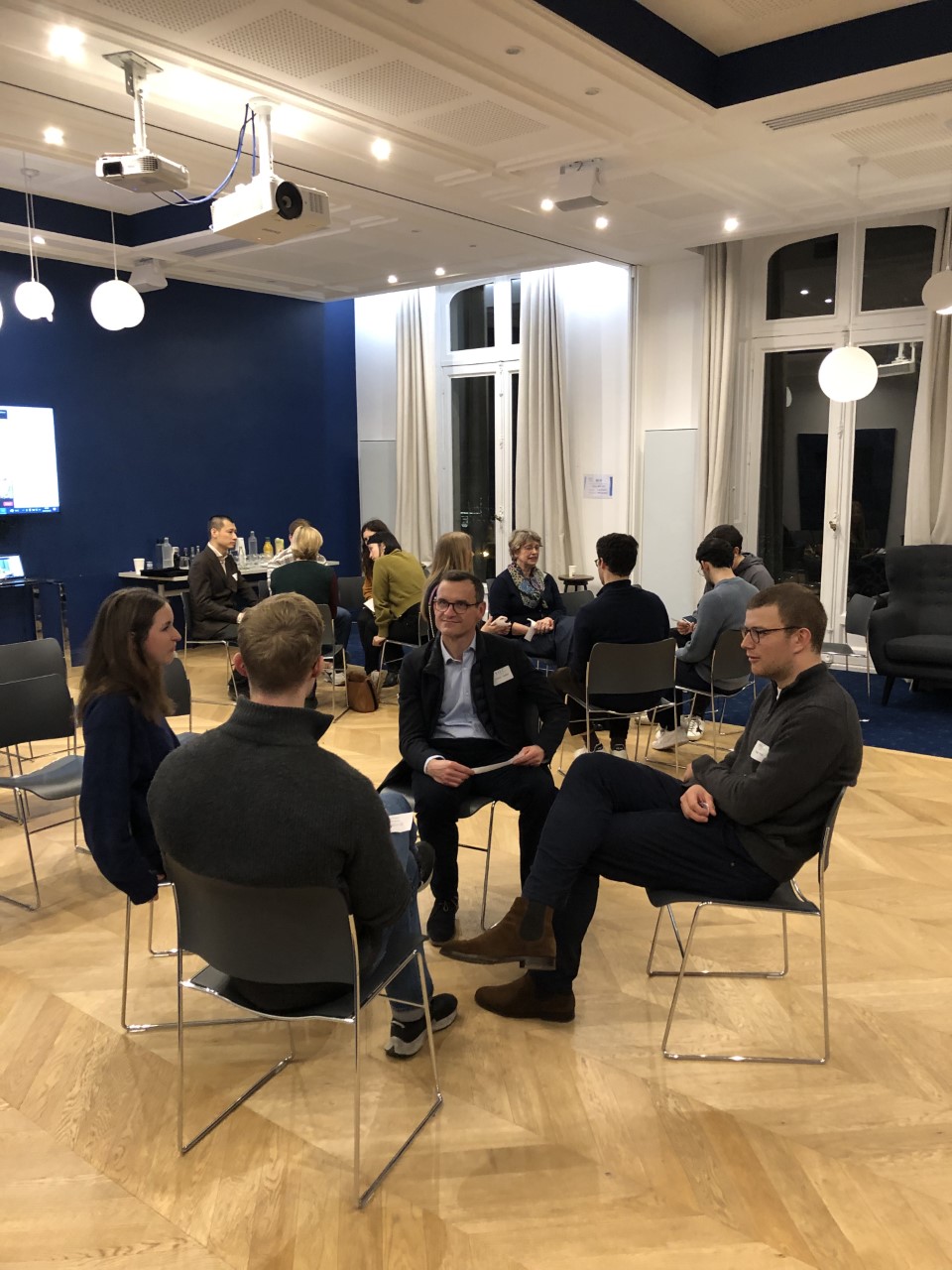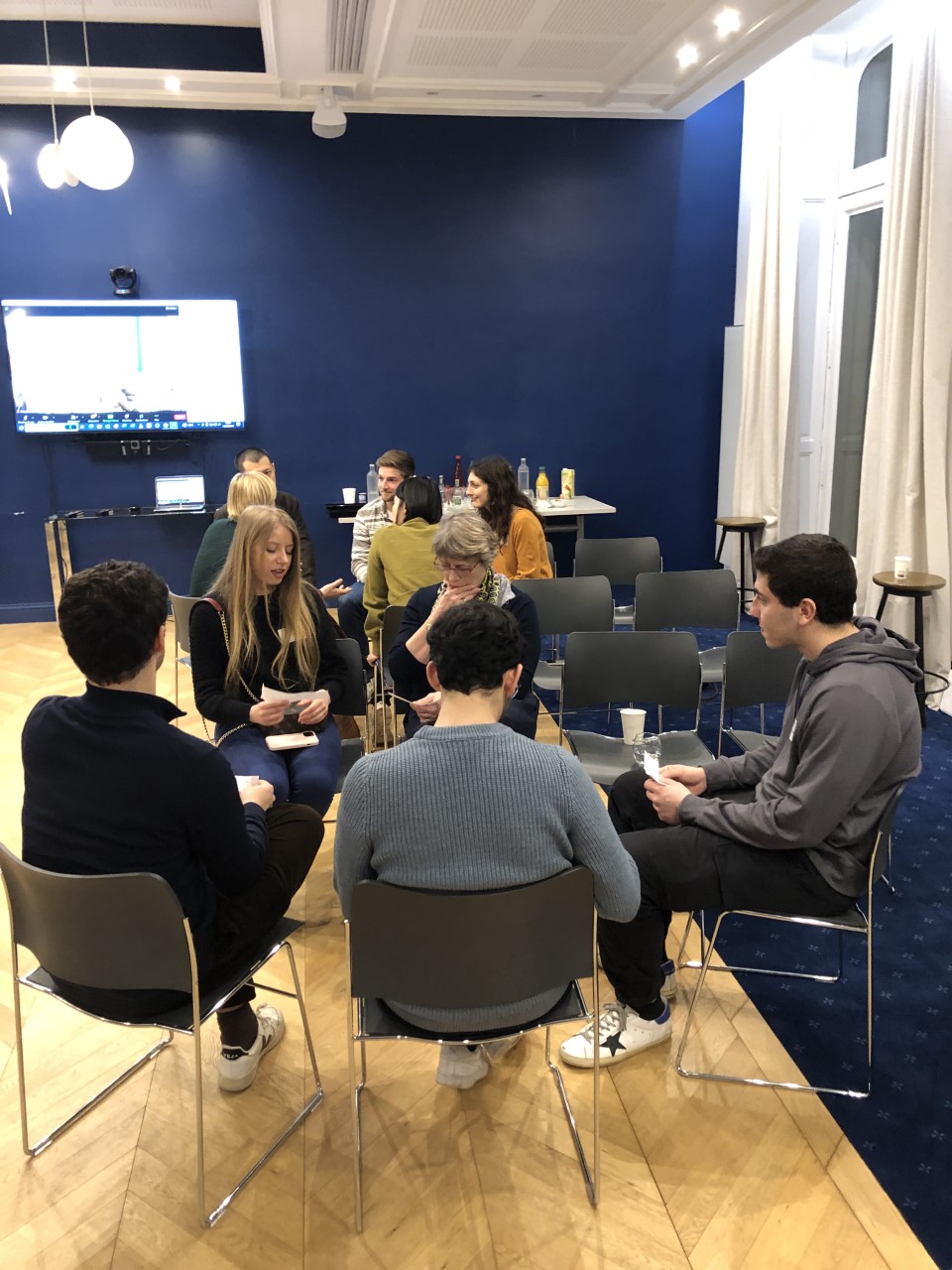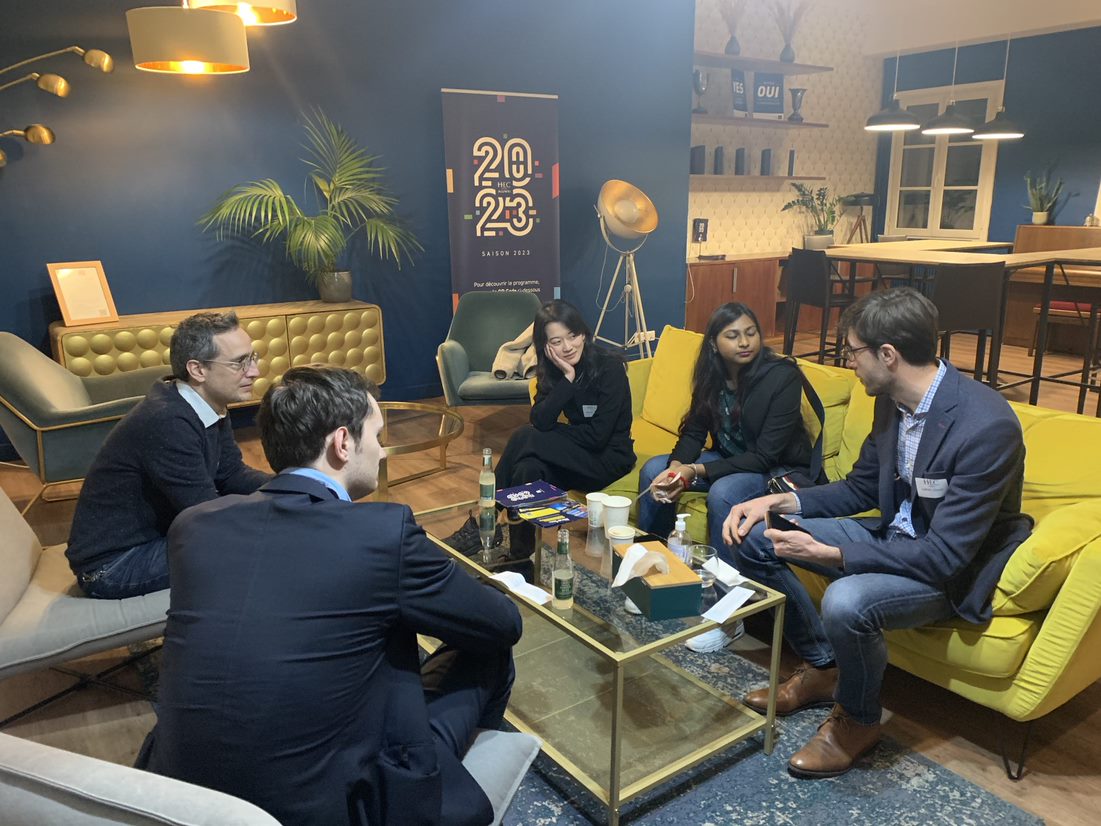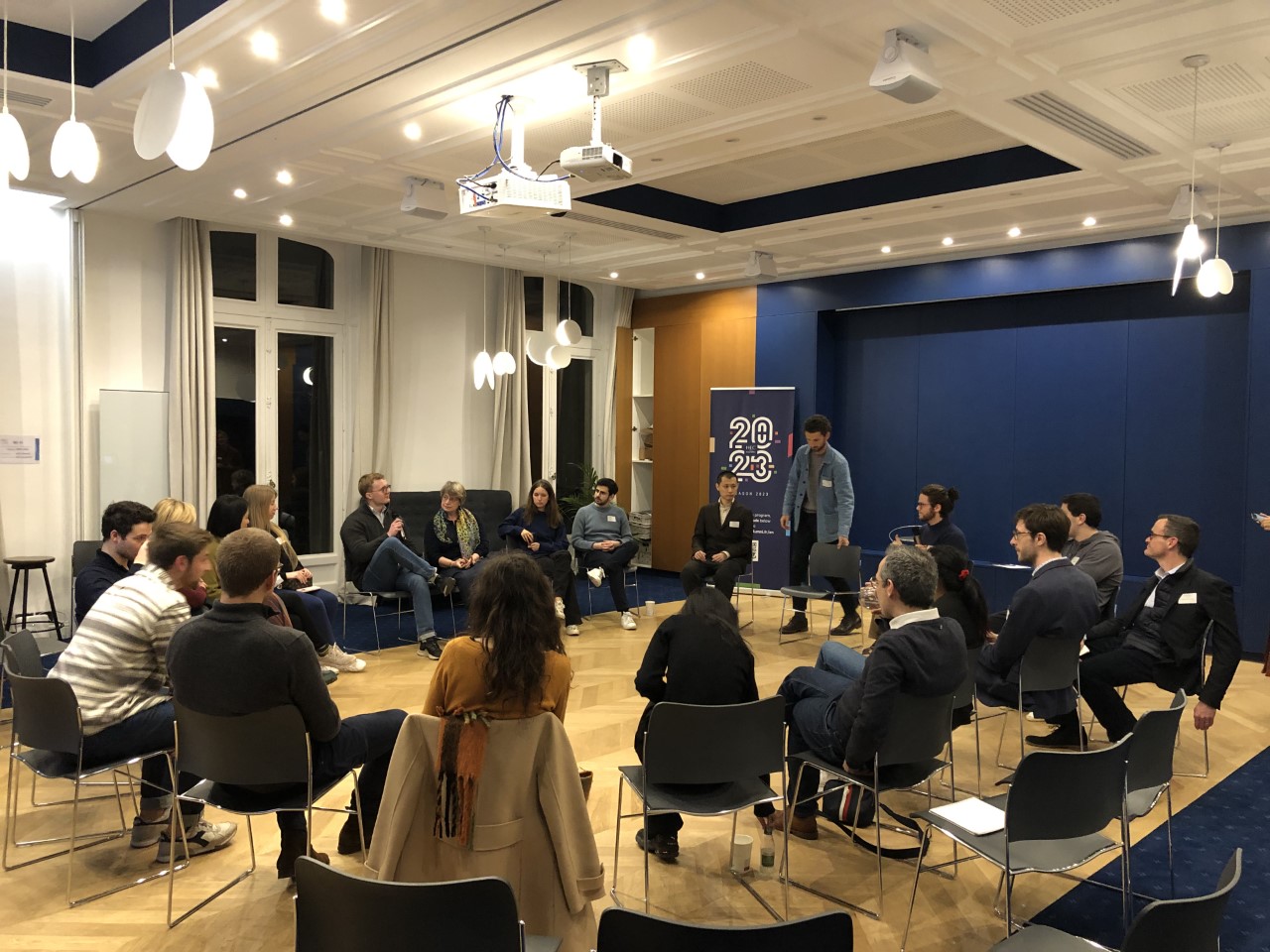Companionship for a Purposeful Career
Inaugurated in 2021 and supported by the Joly Family Chair on Purposeful Leadership, this atypical course offers a unique experience between an alumnus or an alumna and a student in the final year at HEC. This pedagogically innovating Companionship Program helps both partners find their inner selves and clear students’ minds before they embark on their professional careers. Discover what companionship consists of and why people keep appealing to it.
Auteur/Author of this article: Laurianne Thoury & Frédéric Voirin
"Companionship is a demanding yet invaluable learning experience for the development of future leaders: building bridges, transcending preconceptions, being vulnerable, all in order to grow in reciprocity and alliance. Sometimes it happens naturally between two individuals. However, it often poses a challenge, especially when there is a significant difference between two people, as in the case of an intergenerational duo. Teaching these skills at HEC is essential, as it is a school that aims to educate leaders capable of shaping the organizations of tomorrow." Here is how Louis Faure, (H.17, Executive Coach) describes the virtues of this mentoring approach with his associate Hubert de Boisredon (H.86, CEO of Armor Group). Both of them have been experiencing a "companionship" for over 5 years and have together founded the firm Eotekum to transmit this unique way of learning to embody a more courageous leadership.
To define your own self and future success
The Society & Organizations (S&O) Institute of HEC Paris educates students to understand the challenges of purpose and sustainable development in the business world, placing them at the core of their student life and professional projects. In their final year of studies, as they approach the beginning of their careers, numerous demands accumulate: family expectations, comparisons among students, loan repayment, not to mention the modern pressure to "find meaning" in one's work and achieve a good work-life balance. Yet, beneath this whirlwind, there are young individuals with desires, aspirations, fears, preferences, talents... And even more deeply, there are barely sketched questions: What is my worth? How can I be useful? What is essential to me in all of this?
Building a meaningful career based on values and a worldview is a true challenge, as it confronts our often contradictory aspirations between an infinite desire and socio-economic limitations inherent in nature. How can one embark on a career that is purposeful and aligned with one's values and aspirations? How can one make the right decisions that can propel future leaders and managers, their teams, organizations, and society forward?
The objective of the "Companionship for a Purposeful Career Program," supported by the Purpose Center of the S&O Institute, is to assist students in successfully venturing into the creation of meaningful projects and careers for themselves and society. It provides the necessary support for them to face these questions, translate their deep values and aspirations into their own definition of success. This specific mentoring program offers students a space to step back from these pressures, articulate their concerns, and bring forth their needs and aspirations.
Through this work on campus and the mentoring relationship with alumni, future graduates will be able to confront their own essential questions, explore the realm of possibilities, and establish the foundations of a new compass, undoubtedly different from the one that led them to HEC. Students in this program will leave with the ability to make significant choices based on a better self-awareness and "companionship" relationships with others, gradually building a fulfilling and purposeful career. This course does not seek to convey a ready-made morality but rather nourish individual consciousness and freedoms while helping students transition to their future professional lives with a minimum of perspective.
A space of trust
This companionship program is based on two pillars.
First, an elective course composed of 18 hours, created and co-taught by Louis Faure and Benjamin Le Tarnec (a freelance trainer in collective intelligence), during which HEC students learn, through numerous practical exercises, to accompany each other in formulating a new compass for their professional lives. This compass is destined to evolve over time and is already different from the one that led them to HEC. The primary learning objective is the ability to make significant choices consciously, with the help of others. This is a fundamental key to progressing throughout their careers with a leadership that carries meaning for oneself and society at large.
Secondly, the program is based on a "companionship" between students and alumni, developed through regular exchanges (at least 5) between January and May. The main reason it is referred to as "companionship" rather than mentorship is that the quality of the outcome for students is not primarily related to the extent of professional experience of the alumni, but rather to the ability of the two companions to achieve a certain "reciprocity" in the relationship. This reciprocity is notably based on the alumni's willingness to share their own reflections on the meaning of their work and to be challenged by the student. It is the quality of the relationship that truly helps students (and alumni) make progress on their fundamental issues.
Building more reciprocity in the learning experience
This optional course, limited to 70 students, was offered to 5 master's programs this year, divided into two classes, with a majority of non-French speakers (over two-thirds last year). To top it all off, Louis Faure explains that "this year, several tools have been introduced to help participants foster more reciprocity in their learning, which is not very spontaneous at the beginning, especially between two different generations."
The "companionship" pairs are aided in:
1. Explicitly defining the framework to build companionship within a space of freedom and trust.
2. Using nonviolent communication (active listening and engaging in dialogue).
3. Mutually supporting each other on specific topics using the co-development tool.
With these three key elements, the two companions have the necessary tools to implement the companionship approach. And it works: one of the participants in this year's seminar testified that:
"This companionship allows us to address concrete and anxiety-inducing situations for young students, and to defuse certain primary fears such as leaving their parents' home, starting to work, or getting a new job" (André Assouline, HEC student in the M2 Accounting, Finance, and Management program).
"My companion helped me see this transition not as a constraint but as an opportunity to rise and grow professionally," continued the M2 student.
The benefits of companionship in a context of loneliness for young people
Launched in the bleak aftermath of the pandemic, HEC's Companionship for a Purposeful Career program has been a breath of fresh air for a select group of students. According to the Newport Institute, loneliness and depression among young adults have been on the rise for generations, but since 2020, young adults have experienced even greater levels of loneliness and depression due to "COVID-induced social disconnection" and various lockdown measures. A 2020 study by Cigna revealed that 79% of Generation Z members reported feeling lonely. Furthermore, a recent meta-analysis based on data from 345 studies conducted between 1979 and 2019, all utilizing the UCLA Loneliness Scale, showed that each successive generation of young adults is lonelier than the previous one.
André Assouline, a student in the M2 Accounting, Finance, and Management program, speaks highly of the positive impact of HEC Paris' Companionship for a Purposeful Career program: "This program is extraordinary. It incorporates nonviolent communication and co-development, providing genuine personal and professional support. It has been a breath of fresh air for me."
"It's great to be close to HEC alumni or individuals who have faced similar difficulties or challenges."
"It can also help you initiate a conversation with someone you don't know and learn to listen to others in a very objective manner." André adds, "For me, the most valuable aspect of this companionship is getting to know my 'companion.' I think Maiwenn is a wonderful person, truly! We felt comfortable right from the start, engaging in authentic conversations, even during a 1.5-hour remote call."
Among the 35 student companions in 2023, several students from HEC's Grande Ecole Master in Management program, as well as their former companions, have provided positive feedback on this new program. They express that it has transformed their decision-making process.
"It bridges the gap between the student and the professional." (Louis Faure, H.17, Executive Coach at Eotekum)
Antoine, an international student from HEC's Grande Ecole Master in Management program, explains that he "not only found a companion but also a new friend," and his companion mentioned that "there is good reciprocity, even as a professional with 10 years of experience." "I loved the workshop on nonviolent communication. It was great to discuss both our negative and positive experiences."
Jamal expressed his satisfaction, adding that "having a companion is beneficial, making you feel less alone and more confident in your personal life and career path." (Jamal, HEC student in the Grande Ecole Master in Management program).
An intergenerational transmission with a positive impact
After two years of operational experimentation, Louis Faure is unequivocal about the strongly positive impact of this companionship program on its participants:
"One alumnus explained to us this year that he had changed his way of managing his teams thanks to this companionship experience with a student."
Louis Faure further emphasizes, "He humbly realized that he needed to give more space and trust to his teams." Companionship is a true meeting ground between generations, where they challenge, encourage, and genuinely help each other. Because to meet others is to dare to expose oneself, with one's own vulnerability and failures. And it works: "35 HEC alumni participated in our companionship program in 2023, and they are truly engaged in the program, even though they are not paid. They say it is very valuable to them, and 20 HEC alumni from last year returned to participate in this year's program," highlights Louis Faure.
Applications open to all HEC alumni
If the challenge of building a reciprocal relationship with a student appeals to you. If you want to help bridge the generation gap within the HEC network and beyond. If you want to contribute to our mission of developing engaged and self-aware leaders. If you feel that this experience can help you progress on your own path... Then don't hesitate and join the adventure! (by contacting Louis Faure at the following email address: louis.faure@eotekum.com)
Louis Faure
Louis Faure graduated from HEC in 2017, after two gap years in the Philippines running a social enterprise fostering sustainable chicken farming (GK Enchanted Farm). Returning to the Philippines after graduation, he spent 4 years accompanying local and foreign social entrepreneurs while researching on the topic of purposeful leadership, in close contact with Hubert de Boisredon. Louis returned to France in 2020, and together, they founded Eotekum, a company that aims at training leaders to develop the capacity to take courageous decisions for the common good, and to carry through with implementing purposeful intentions on the long-term, thanks to Companionship. He is now a trainer and a leadership coach.
Pictures of the final session of the HEC Companionship Program 2023
More info about the S&O Purpose Center



